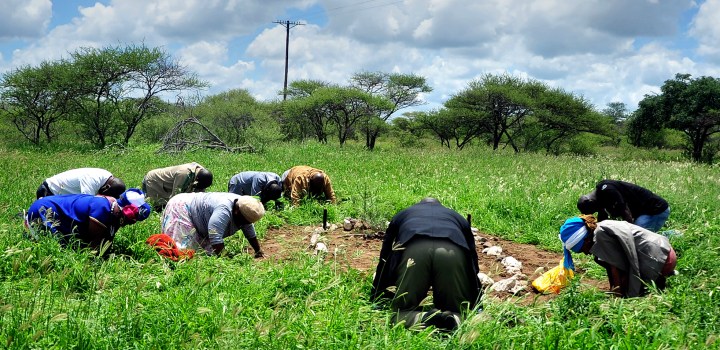MAVERICK CITIZEN OP-ED
Ramaphosa’s planned land reform agency looks like another political delaying ploy

The president has announced yet another forum to fast-track land reform. Perhaps if he and his ruling-party bigwigs took a moment to walk in the shoes of people who have suffered so much, they would appreciate it is not another agency we need.
Just two days before the last day of 2020, members of a clan of land claimants gathered to perform spiritual rites at the site they believe is the burial place of one of their ancestors.
Their forebears from the Molele clan were violently removed from Sesele, the land they called home since the 1600s, through systematic unjust laws between the 1850s and 1960s. The bulk of the forced removals were enforced in 1936 after which some of the Molele remained as labour tenants on farms that were handed to whites by the Union of South Africa.
As a result, most of the people from the generation now pursuing the land claim have never lived on the land and have little knowledge of where the elders lived except for a little information passed down by those who were still alive when the claim was lodged 22 years ago.
The site where they believe their great ancestor Nkabe is buried was pointed out by a spiritual diviner using mankgonyane in 2019. Mankgonyane could best be described as a satellite of the gods, a sacred divining instrument from which gifted healers can interpret messages passed to them from the spiritual world.
In 1998, the clan lodged a claim with the Commission on Restitution of Land Rights under the Restitution of Land Rights Act 22 of 1994. The claim remains unresolved. Most of the elders who were born on the land and experienced the violent forced removals have died.
The long wait has taken its toll on the clan, who have ambitious plans to turn the land, once it is restored to them, into a thriving agricultural hub. They hope their use of the land will help to eliminate the poverty and joblessness that has ravaged them for decades.
They wish also that it would help reduce or eliminate the destructive practice of migrant labour that has seen many of their kin swallowed by the big cities in search of work.
But the long wait for restitution continues to frustrate their plans and dreams. Visiting the farm to conduct spiritual and traditional rites remains an insanely controlled exercise.
They must seek permission from the current owner weeks in advance and adhere to strict regulations that may be interpreted to frustrate and deter their efforts to plan further visits. They have even asked that I don’t take this up with the landowner in case this upsets him and he refuses to grant them permission next time.
On Tuesday, 29 December, the Molele visited the farm after the owner granted them permission under strict conditions.
As part of the conditions, only nine people could access the farm, using only one vehicle. They were also ordered to adhere to a tight time limit and were warned that permission to access the farm would be withdrawn if they did not show up at the farm gate 15 minutes after the agreed time. The time they were allocated on the farm was also strictly limited.
Unfortunately, the Molele case mirrors the frustration of thousands of people whose land claims from 22 years ago are still not resolved. While they live in poverty in barren villages, which the previous regimes designated as labour reserves, the land of their ancestors continues to enrich beneficiaries of an unjust system.
In May 2020, the Commission on Restitution of Land Rights (CRLR) told a meeting of the parliamentary Portfolio Committee on Agriculture, Land Reform and Rural Development that targets for its five-year strategic plan were to settle 2,150 land claims and to finalise 2,200 claims in line with the current budget and capacity.
The commission said there were 7,743 outstanding land claims. But it noted that due to the Covid-19 pandemic and resultant lockdown, it had to revise its targets for 2020/21.
Earlier, in the commission’s 2019/20 annual report, the chief land claims commissioner, Nomfundo Ntloko-Gobodo, mentioned that the commission had “improved dramatically from the rather dismal 42% delivery on settled claims in the previous year to settling 436 claims this year”.
In addition, it had been able to “finalise 686 claims to the amount of R2,683,313 that flowed directly to beneficiaries by ways of land or financial compensation”.
In the same report, Minister of Agriculture, Land Reform and Rural Development Thoko Didiza said that “in excess of 49,294 South Africans benefited through the programme by having their land restored, or, where this was not possible or feasible, being paid financial compensation”.
The pathetic statistics justify the general feeling of despair and frustration on the ground at the slow pace of resolving land claims. And now it seems the government, which since 1998 has failed to implement various strategies outlined for this purpose, has found another convenient excuse for delays in the outbreak of the Covid-19 pandemic.
The president’s pronouncement appears to be yet another ploy, a delaying tactic and sweet talk by a political party that has failed to deal decisively with the issue of land restitution since 1994.
In his 2021 State of the Nation Address, President Cyril Ramaphosa announced that during the next financial year the government will establish a land and agrarian reform agency to fast-track land reform.
Ramaphosa did not elaborate on how or whether this new mooted agency will benefit those like the Molele, who have waited for almost a quarter of a century for the democratic government to resolve their claims.
The president’s pronouncement appears to be yet another ploy, a delaying tactic and sweet talk by a political party that has failed to deal decisively with the issue of land restitution since 1994.
Such has been the ANC’s indifference and reluctance to confront the land question that it may seem justified to conclude the land question was never part of the party’s agenda during the Struggle.
The ruling party has come up with so many programmes and set up structures set to deal with the land question. It gave them names full of promise, such as Operation Phakisa, the Kuyasa Project and the Inter-Ministerial Committee on Land Reform.
It also appointed the High-Level Panel on the Assessment of Key Legislation and Acceleration of Fundamental Change, led by former president Kgalema Motlanthe, to also cast its eye on the issue of land.
Some of these structures have made valuable findings and proposed solutions. But it appears this is where it all ends. On paper, most of the government’s policies appear so solid, practical and implementable.
But when it comes to delivery, the government and its agencies have been rather impotent, to the extent that some critics have estimated that at the current rate that land claims are being dealt with, it could take another 300 years or more before they are all settled. The government has cited conflict among land claimants, high prices charged by white landowners and long delays in researching claims among the reasons for the slow pace of settling claims.
So ineffective has the ANC been on land restitution and reform that it has taken a minority party in Parliament, the EFF, to force it to vote in support of a motion to amend the Constitution to allow for the expropriation of land without compensation.
While this populist strategy has scored major political points for the EFF, it has put the ANC under even more pressure to act on the land issue.
Even before the motion to amend Section 25 was debated in Parliament and hearings held nationally, such was the mounting pressure on the ANC to address the issue of land that in the run-up to the 2014 election it rushed to amend the Restitution of Land Rights Act 22 of 1994.
Fortunately, in the 2016 Land Access Movement of South Africa (Lamosa) judgment, the Constitutional Court declared the amendment invalid and prohibited the Commission on Restitution of Land Rights from addressing new land claims until the older ones were settled.
The ruling prevented a chaotic scenario in which thousands of claims would be lodged while the state was clearly failing to deal with scores of others outstanding from the 1998 cut-off date.
In a unanimous judgment in the Lamosa matter in July 2016, Judge Mbuyiseli Madlanga summarised the land issue:
“This matter concerns the painful, emotive subject of colonial- and apartheid-era land dispossession. A subject that – despite the democratic government’s efforts at resolution through the Restitution of Land Rights Act[1] (Restitution Act) – continues to plague South Africa’s politico-legal landscape. To those who personally experienced the forced removals and those who – instead of inheriting the illegitimately wrestled land – inherited the pain of loss of homes or property, the dispossessions are not merely colonial- and apartheid-era memories. They continue to be post-apartheid realities. And it is understandable why that should be so.”
Tragically, the long wait for redress continues to be a post-apartheid reality for millions of land claimants such as the Molele.
‘‘It is frustrating dealing with the department [of rural development and land reform]. They will send you from one person to the next. It has been 16 years and we are still not close to getting our land back,” Frans Molele, who is leading his clan’s efforts to regain the land, told me five years ago.
Perhaps if the president and his ruling-party bigwigs took a moment to walk in the shoes of these people who have suffered so much, they would appreciate that it is not another agency we need, but rather action – fast, decisive and concerted.
What guarantee does the government have that this proposed agency will not be bogged down by red tape, administrative wrangling and a lack of capacity cited as one of the major reasons for the delay in processing land claims?
Or is it perhaps, with a local government election on the horizon, another electioneering ploy to raise the hopes of the dispossessed?
Among the Molele clan party who came to pay their respects at the grave of their ancestor in December was a young university student who was born two years after the 31 December 1998 cut-off date for the submission of land claims.
While the memories of her forebears and adults would generally be that of a cruel government that dispossessed them of their birthright, hers would be shaped by the democratic government’s prolonging of their suffering and failure to right the wrongs of the past smoothly and timeously. DM/MC




















 Become an Insider
Become an Insider
Comments - Please login in order to comment.